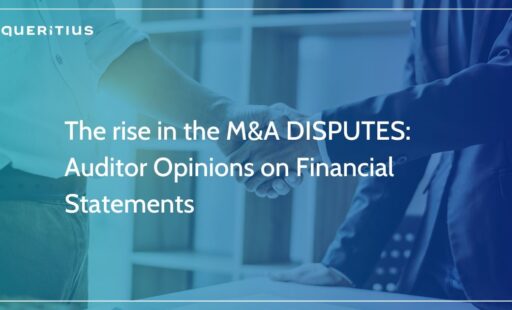The rise in M&A disputes and what to do about it: Auditor opinions on financial statements

17. 01. 2024
Auditors are entrusted with the responsibility of conducting a thorough examination of companies’ financial statements. Auditor opinions and financial statements play a crucial role for parties in M&A (mergers and acquisitions) transactions when negotiating price determination mechanisms (for example, earn-out or locked-box accounts), as they are the basis for assessing the condition and value of a company.
However, when the financial information provided turns out to be inaccurate or misleading post-transaction, reliance on financial statements and auditor opinions may lead to disputes. This begs the question of whether parties can, with no hesitation, rely on these documents and what possibilities are there for buyers to check that information before sealing the deal.
According to a 2020 study by Association of Certified Fraud Examiners (ACFE) Fraud Examiners (“ACFE”), financial statement fraud, that is an intentional material misstatement or omission in the financial statements, is among the three primary categories of occupational fraud in companies. Such misstatement or omission could take the form of improper asset valuation or recording of fictitious revenues. However, such fraud schemes are very rarely discovered by auditors. According to ACFE, fraud was revealed through an external audit only in 4 % of analyzed cases.
The 2021 report of the Polish Agency of Audit Supervision shows that over 97 % of all auditor opinions in Poland are issued without reservations about the financial statements. At the same time, as many as 19 % of these audit opinions failed to identify significant distortions in financial statements resulting from errors, and 8 % failed to identify fraud.
Enron, Wirecard, and Getback are only a few cases where companies purported to rely on them having been audited by top-tier auditor firms, failing to substantiate such arguments. In 2023 KPMG faced scrutiny over its audit work when two banks collapsed within weeks of their audits, in which KPMG did not raise issues.
In our view, an audit opinion is an opinion of an auditor about his or her “reasonable assurance” that the financial statement of a company conforms to the laws and accounting standards and is not a piece of formally conclusive evidence. In particular, article 68 point 2) and article 83 of the Polish Act on Auditors do not establish any presumptions nor render an auditor’s report a piece of conclusive evidence on the accuracy or correctness of a company’s accounts.
Therefore, in order to make arguments based on the above documents, parties need to:
➡️ assess the independence of the auditor (whether he or she has a financial motive to give a skewed opinion),
➡️ assess the source of the input information (whether the financial information is verified),
➡️ identify the accounting policy of the company that is inspected.
by Karolina Czarneckhttps://queritius.com/wp/our-team/karolina-czarnecka/a
